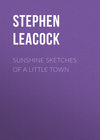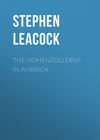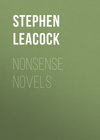Kitabı oku: «Sunshine Sketches of a Little Town», sayfa 9
That wouldn't matter so much, but think of the Pepperleighs and Zena! Everything would be over with them at once. Pupkin knew just what the judge thought of riches and luxuries. How often had he heard the judge pass sentences of life imprisonment on Pierpont Morgan and Mr. Rockefeller. How often had Pupkin heard him say that any man who received more than three thousand dollars a year (that was the judicial salary in the Missinaba district) was a mere robber, unfit to shake the hand of an honest man. Bitter! I should think he was! He was not so bitter, perhaps, as Mr. Muddleson, the principal of the Mariposa high school, who said that any man who received more than fifteen hundred dollars was a public enemy. He was certainly not so bitter as Trelawney, the post-master, who said that any man who got from society more than thirteen hundred dollars (apart from a legitimate increase in recognition of a successful election) was a danger to society. Still, he was bitter. They all were in Mariposa. Pupkin could just imagine how they would despise his father!
And Zena! That was the worst of all. How often had, Pupkin heard her say that she simply hated diamonds wouldn't wear them, despised them, wouldn't give a thank you for a whole tiara of them! As for motor cars and steam yachts,—well, it was pretty plain that that sort of thing had no chance with Zena Pepperleigh. Why, she had told Pupkin one night in the canoe that she would only marry a man who was poor and had his way to make and would hew down difficulties for her sake. And when Pupkin couldn't answer the argument she was quite cross and silent all the way home.
What was Peter Pupkin doing, then, at eight hundred dollars in a bank in Mariposa? If you ask that, it means that you know nothing of the life of the Maritime Provinces and the sturdy temper of the people. I suppose there are no people in the world who hate luxury and extravagance and that sort of thing quite as much as the Maritime Province people, and, of them, no one hated luxury more than Pupkin senior.
Don't mistake the man. He wore a long sealskin coat in winter, yes; but mark you, not as a matter of luxury, but merely as a question of his lungs. He smoked, I admit it, a thirty-five cent cigar, not because he preferred it, but merely through a delicacy of the thorax that made it imperative. He drank champagne at lunch, I concede the point, not in the least from the enjoyment of it, but simply on account of a peculiar affection of the tongue and lips that positively dictated it. His own longing—and his wife shared it—was for the simple, simple life—an island somewhere, with birds and trees. They had bought three or four islands—one in the St. Lawrence, and two in the Gulf, and one off the coast of Maine—looking for this sort of thing. Pupkin senior often said that he wanted to have some place that would remind him of the little old farm up the Aroostook where he was brought up. He often bought little old farms, just to try them, but they always turned out to be so near a city that he cut them into real estate lots, without even having had time to look at them.
But—and this is where the emphasis lay—in the matter of luxury for his only son, Peter, Pupkin senior was a Maritime Province man right to the core, with all the hardihood of the United Empire Loyalists ingrained in him. No luxury for that boy! No, sir! From his childhood, Pupkin senior had undertaken, at the least sign of luxury, to "tan it out of him," after the fashion still in vogue in the provinces. Then he sent him to an old-fashioned school to get it "thumped out of him," and after that he had put him for a year on a Nova Scotia schooner to get it "knocked out of him." If, after all that, young Pupkin, even when he came to Mariposa, wore cameo pins and daffodil blazers, and broke out into ribbed silk saffron ties on pay day, it only shows that the old Adam still needs further tanning even in the Maritime Provinces.
Young Pupkin, of course, was to have gone into law. That was his father's cherished dream and would have made the firm Pupkin, Pupkin, Pupkin, and Pupkin, as it ought to have been. But young Peter was kept out of the law by the fool system of examinations devised since his father's time. Hence there was nothing for it but to sling him into a bank; "sling him" was, I think, the expression. So his father decided that if Pupkin was to be slung, he should be slung good and far—clean into Canada (you know the way they use that word in the Maritime Provinces). And to sling Pupkin he called in the services of an old friend, a man after his own heart, just as violent as himself, who used to be at the law school in the city with Pupkin senior thirty years ago. So this friend, who happened to live in Mariposa, and who was a violent man, said at once: "Edward, by Jehoshaphat! send the boy up here."
So that is how Pupkin came to Mariposa. And if, when he got there, his father's friend gave no sign, and treated the boy with roughness and incivility, that may have been, for all I know, a continuation of the "tanning" process of the Maritime people.
Did I mention that the Pepperleigh family, generations ago, had taken up land near the Aroostook, and that it was from there the judge's father came to Tecumseh township? Perhaps not, but it doesn't matter.
But surely after such reminiscences as these the awful things that are impending over Mr. Pupkin must be kept for another chapter.
NINE. The Mariposa Bank Mystery
Suicide is a thing that ought not to be committed without very careful thought. It often involves serious consequences, and in some cases brings pain to others than oneself.
I don't say that there is no justification for it. There often is. Anybody who has listened to certain kinds of music, or read certain kinds of poetry, or heard certain kinds of performances upon the concertina, will admit that there are some lives which ought not to be continued, and that even suicide has its brighter aspects.
But to commit suicide on grounds of love is at the best a very dubious experiment. I know that in this I am expressing an opinion contrary to that of most true lovers who embrace suicide on the slightest provocation as the only honourable termination of an existence that never ought to have begun.
I quite admit that there is a glamour and a sensation about the thing which has its charm, and that there is nothing like it for causing a girl to realize the value of the heart that she has broken and which breathed forgiveness upon her at the very moment when it held in its hand the half-pint of prussic acid that was to terminate its beating for ever.
But apart from the general merits of the question, I suppose there are few people, outside of lovers, who know what it is to commit suicide four times in five weeks.
Yet this was what happened to Mr. Pupkin, of the Exchange Bank of Mariposa.
Ever since he had known Zena Pepperleigh he had realized that his love for her was hopeless. She was too beautiful for him and too good for him; her father hated him and her mother despised him; his salary was too small and his own people were too rich.
If you add to all that that he came up to the judge's house one night and found a poet reciting verses to Zena, you will understand the suicide at once. It was one of those regular poets with a solemn jackass face, and lank parted hair and eyes like puddles of molasses. I don't know how he came there—up from the city, probably—but there he was on the Pepperleighs' verandah that August evening. He was reciting poetry—either Tennyson's or Shelley's, or his own, you couldn't tell—and about him sat Zena with her hands clasped and Nora Gallagher looking at the sky and Jocelyn Drone gazing into infinity, and a little tubby woman looking at the poet with her head falling over sideways—in fact, there was a whole group of them.
I don't know what it is about poets that draws women to them in this way. But everybody knows that a poet has only to sit and saw the air with his hands and recite verses in a deep stupid voice, and all the women are crazy over him. Men despise him and would kick him off the verandah if they dared, but the women simply rave over him.
So Pupkin sat there in the gloom and listened to this poet reciting Browning and he realized that everybody understood it but him. He could see Zena with her eyes fixed on the poet as if she were hanging on to every syllable (she was; she needed to), and he stood it just about fifteen minutes and then slid off the side of the verandah and disappeared without even saying good-night.
He walked straight down Oneida Street and along the Main Street just as hard as he could go. There was only one purpose in his mind,—suicide. He was heading straight for Jim Eliot's drug store on the main corner and his idea was to buy a drink of chloroform and drink it and die right there on the spot.
As Pupkin walked down the street, the whole thing was so vivid in his mind that he could picture it to the remotest detail. He could even see it all in type, in big headings in the newspapers of the following day:
APPALLING SUICIDE. PETER PUPKIN POISONED.
He perhaps hoped that the thing might lead to some kind of public enquiry and that the question of Browning's poetry and whether it is altogether fair to allow of its general circulation would be fully ventilated in the newspapers.
Thinking of that, Pupkin came to the main corner.
On a warm August evening the drug store of Mariposa, as you know, is all a blaze of lights. You can hear the hissing of the soda-water fountain half a block away, and inside the store there are ever so many people—boys and girls and old people too—all drinking sarsaparilla and chocolate sundaes and lemon sours and foaming drinks that you take out of long straws. There is such a laughing and a talking as you never heard, and the girls are all in white and pink and cambridge blue, and the soda fountain is of white marble with silver taps, and it hisses and sputters, and Jim Eliot and his assistant wear white coats with red geraniums in them, and it's just as gay as gay.
The foyer of the opera in Paris may be a fine sight, but I doubt if it can compare with the inside of Eliot's drug store in Mariposa—for real gaiety and joy of living.
This night the store was especially crowded because it was a Saturday and that meant early closing for all the hotels, except, of course, Smith's. So as the hotels were shut, the people were all in the drug store, drinking like fishes. It just shows the folly of Local Option and the Temperance Movement and all that. Why, if you shut the hotels you simply drive the people to the soda fountains and there's more drinking than ever, and not only of the men, too, but the girls and young boys and children. I've seen little things of eight and nine that had to be lifted up on the high stools at Eliot's drug store, drinking great goblets of lemon soda, enough to burst them—brought there by their own fathers, and why? Simply because the hotel bars were shut.
What's the use of thinking you can stop people drinking merely by cutting off whiskey and brandy? The only effect is to drive them to taking lemon sour and sarsaparilla and cherry pectoral and caroka cordial and things they wouldn't have touched before. So in the long run they drink more than ever. The point is that you can't prevent people having a good time, no matter how hard you try. If they can't have it with lager beer and brandy, they'll have it with plain soda and lemon pop, and so the whole gloomy scheme of the temperance people breaks down, anyway.
But I was only saying that Eliot's drug store in Mariposa on a Saturday night is the gayest and brightest spot in the world.
And just imagine what a fool of a place to commit suicide in!
Just imagine going up to the soda-water fountain and asking for five cents' worth of chloroform and soda! Well, you simply can't, that's all.
That's the way Pupkin found it. You see, as soon as he came in, somebody called out: "Hello, Pete!" and one or two others called: "Hullo, Pup!" and some said: "How goes it?" and others: "How are you toughing it?" and so on, because you see they had all been drinking more or less and naturally they felt jolly and glad-hearted.
So the upshot of it was that instead of taking chloroform, Pupkin stepped up to the counter of the fountain and he had a bromo-seltzer with cherry soda, and after that he had one of those aerated seltzers, and then a couple of lemon seltzers and a bromo-phizzer.
I don't know if you know the mental effect of a bromo-seltzer.
But it's a hard thing to commit suicide on.
You can't.
You feel so buoyant.
Anyway, what with the phizzing of the seltzer and the lights and the girls, Pupkin began to feel so fine that he didn't care a cuss for all the Browning in the world, and as for the poet—oh, to blazes with him! What's poetry, anyway?—only rhymes.
So, would you believe it, in about ten minutes Peter Pupkin was off again and heading straight for the Pepperleighs' house, poet or no poet, and, what was more to the point, he carried with him three great bricks of Eliot's ice cream—in green, pink and brown layers. He struck the verandah just at the moment when Browning was getting too stale and dreary for words. His brain was all sizzling and jolly with the bromo-seltzer, and when he fetched out the ice cream bricks and Zena ran to get plates and spoons to eat it with, and Pupkin went with her to help fetch them and they picked out the spoons together, they were so laughing and happy that it was just a marvel. Girls, you know, need no bromo-seltzer. They're full of it all the time.
And as for the poet—well, can you imagine how Pupkin felt when Zena told him that the poet was married, and that the tubby little woman with her head on sideways was his wife?
So they had the ice cream, and the poet ate it in bucketsful. Poets always do. They need it. And after it the poet recited some stanzas of his own and Pupkin saw that he had misjudged the man, because it was dandy poetry, the very best. That night Pupkin walked home on air and there was no thought of chloroform, and it turned out that he hadn't committed suicide, but like all lovers he had commuted it.
I don't need to describe in full the later suicides of Mr. Pupkin, because they were all conducted on the same plan and rested on something the same reasons as above.
Sometimes he would go down at night to the offices of the bank below his bedroom and bring up his bank revolver in order to make an end of himself with it. This, too, he could see headed up in the newspapers as:
BRILLIANT BOY BANKER BLOWS OUT BRAINS.
But blowing your brains out is a noisy, rackety performance, and Pupkin soon found that only special kinds of brains are suited for it. So he always sneaked back again later in the night and put the revolver in its place, deciding to drown himself instead. Yet every time that he walked down to the Trestle Bridge over the Ossawippi he found it was quite unsuitable for drowning—too high, and the water too swift and black, and the rushes too gruesome—in fact, not at all the kind of place for a drowning.
Far better, he realized, to wait there on the railroad track and throw himself under the wheels of the express and be done with it. Yet, though Pupkin often waited in this way for the train, he was never able to pick out a pair of wheels that suited him. Anyhow, it's awfully hard to tell an express from a fast freight.
I wouldn't mention these attempts at suicide if one of them hadn't finally culminated in making Peter Pupkin a hero and solving for him the whole perplexed entanglement of his love affair with Zena Pepperleigh. Incidentally it threw him into the very centre of one of the most impenetrable bank mysteries that ever baffled the ingenuity of some of the finest legal talent that ever adorned one of the most enterprising communities in the country.
It happened one night, as I say, that Pupkin decided to go down into the office of the bank and get his revolver and see if it would blow his brains out. It was the night of the Firemen's Ball and Zena had danced four times with a visitor from the city, a man who was in the fourth year at the University and who knew everything. It was more than Peter Pupkin could bear. Mallory Tompkins was away that night, and when Pupkin came home he was all alone in the building, except for Gillis, the caretaker, who lived in the extension at the back.
He sat in his room for hours brooding. Two or three times he picked up a book—he remembered afterwards distinctly that it was Kant's Critique of Pure Reason—and tried to read it, but it seemed meaningless and trivial. Then with a sudden access of resolution he started from his chair and made his way down the stairs and into the office room of the bank, meaning to get a revolver and kill himself on the spot and let them find his body lying on the floor.
It was then far on in the night and the empty building of the bank was as still as death. Pupkin could hear the stairs creak under his feet, and as he went he thought he heard another sound like the opening or closing of a door. But it sounded not like the sharp ordinary noise of a closing door but with a dull muffled noise as if someone had shut the iron door of a safe in a room under the ground. For a moment Pupkin stood and listened with his heart thumping against his ribs. Then he kicked his slippers from his feet and without a sound stole into the office on the ground floor and took the revolver from his teller's desk. As he gripped it, he listened to the sounds on the back-stairway and in the vaults below.
I should explain that in the Exchange Bank of Mariposa the offices are on the ground floor level with the street. Below this is another floor with low dark rooms paved with flagstones, with unused office desks and with piles of papers stored in boxes. On this floor are the vaults of the bank, and lying in them in the autumn—the grain season—there is anything from fifty to a hundred thousand dollars in currency tied in bundles. There is no other light down there than the dim reflection from the lights out on the street, that lies in patches on the stone floor.
I think as Peter Pupkin stood, revolver in hand, in the office of the bank, he had forgotten all about the maudlin purpose of his first coming. He had forgotten for the moment all about heroes and love affairs, and his whole mind was focussed, sharp and alert, with the intensity of the night-time, on the sounds that he heard in the vault and on the back-stairway of the bank.
Straight away, Pupkin knew what it meant as plainly as if it were written in print. He had forgotten, I say, about being a hero and he only knew that there was sixty thousand dollars in the vault of the bank below, and that he was paid eight hundred dollars a year to look after it.
As Peter Pupkin stood there listening to the sounds in his stockinged feet, his faced showed grey as ashes in the light that fell through the window from the street. His heart beat like a hammer against his ribs. But behind its beatings was the blood of four generations of Loyalists, and the robber who would take that sixty thousand dollars from the Mariposa bank must take it over the dead body of Peter Pupkin, teller.
Pupkin walked down the stairs to the lower room, the one below the ground with the bank vault in it, with as fine a step as any of his ancestors showed on parade. And if he had known it, as he came down the stairway in the front of the vault room, there was a man crouched in the shadow of the passage way by the stairs at the back. This man, too, held a revolver in his hand, and, criminal or not, his face was as resolute as Pupkin's own. As he heard the teller's step on the stair, he turned and waited in the shadow of the doorway without a sound.
There is no need really to mention all these details. They are only of interest as showing how sometimes a bank teller in a corded smoking jacket and stockinged feet may be turned into such a hero as even the Mariposa girls might dream about.
All of this must have happened at about three o'clock in the night. This much was established afterwards from the evidence of Gillis, the caretaker. When he first heard the sounds he had looked at his watch and noticed that it was half-past two; the watch he knew was three-quarters of an hour slow three days before and had been gaining since. The exact time at which Gillis heard footsteps in the bank and started downstairs, pistol in hand, became a nice point afterwards in the cross-examination.
But one must not anticipate. Pupkin reached the iron door of the bank safe, and knelt in front of it, feeling in the dark to find the fracture of the lock. As he knelt, he heard a sound behind him, and swung round on his knees and saw the bank robber in the half light of the passage way and the glitter of a pistol in his hand. The rest was over in an instant. Pupkin heard a voice that was his own, but that sounded strange and hollow, call out: "Drop that, or I'll fire!" and then just as he raised his revolver, there came a blinding flash of light before his eyes, and Peter Pupkin, junior teller of the bank, fell forward on the floor and knew no more.
At that point, of course, I ought to close down a chapter, or volume, or, at least, strike the reader over the head with a sandbag to force him to stop and think. In common fairness one ought to stop here and count a hundred or get up and walk round a block, or, at any rate, picture to oneself Peter Pupkin lying on the floor of the bank, motionless, his arms distended, the revolver still grasped in his hand. But I must go on.
By half-past seven on the following morning it was known all over Mariposa that Peter Pupkin the junior teller of the Exchange had been shot dead by a bank robber in the vault of the building. It was known also that Gillis, the caretaker, had been shot and killed at the foot of the stairs, and that the robber had made off with fifty thousand dollars in currency; that he had left a trail of blood on the sidewalk and that the men were out tracking him with bloodhounds in the great swamps to the north of the town.
This, I say, and it is important to note it, was what they knew at half-past seven. Of course as each hour went past they learned more and more. At eight o'clock it was known that Pupkin was not dead, but dangerously wounded in the lungs. At eight-thirty it was known that he was not shot in the lungs, but that the ball had traversed the pit of his stomach.
At nine o'clock it was learned that the pit of Pupkin's stomach was all right, but that the bullet had struck his right ear and carried it away. Finally it was learned that his ear had not exactly been carried away, that is, not precisely removed by the bullet, but that it had grazed Pupkin's head in such a way that it had stunned him, and if it had been an inch or two more to the left it might have reached his brain. This, of course, was just as good as being killed from the point of view of public interest.
Indeed, by nine o'clock Pupkin could be himself seen on the Main Street with a great bandage sideways on his head, pointing out the traces of the robber. Gillis, the caretaker, too, it was known by eight, had not been killed. He had been shot through the brain, but whether the injury was serious or not was only a matter of conjecture. In fact, by ten o'clock it was understood that the bullet from the robber's second shot had grazed the side of the caretaker's head, but as far as could be known his brain was just as before. I should add that the first report about the bloodstains and the swamp and the bloodhounds turned out to be inaccurate. The stains may have been blood, but as they led to the cellar way of Netley's store they may have also been molasses, though it was argued, to be sure, that the robber might well have poured molasses over the bloodstains from sheer cunning.
It was remembered, too, that there were no bloodhounds in Mariposa, although, mind you, there are any amount of dogs there.
So you see that by ten o'clock in the morning the whole affair was settling into the impenetrable mystery which it ever since remained.
Not that there wasn't evidence enough. There was Pupkin's own story and Gillis's story, and the stories of all the people who had heard the shots and seen the robber (some said, the bunch of robbers) go running past (others said, walking past), in the night. Apparently the robber ran up and down half the streets of Mariposa before he vanished.
But the stories of Pupkin and Gillis were plain enough. Pupkin related that he heard sounds in the bank and came downstairs just in time to see the robber crouching in the passage way, and that the robber was a large, hulking, villainous looking man, wearing a heavy coat. Gillis told exactly the same story, having heard the noises at the same time, except that he first described the robber as a small thin fellow (peculiarly villainous looking, however, even in the dark), wearing a short jacket; but on thinking it over, Gillis realized that he had been wrong about the size of the criminal, and that he was even bigger, if anything, than what Mr. Pupkin thought. Gillis had fired at the robber; just at the same moment had Mr. Pupkin.
Beyond that, all was mystery, absolute and impenetrable.
By eleven o'clock the detectives had come up from the city under orders from the head of the bank.
I wish you could have seen the two detectives as they moved to and fro in Mariposa—fine looking, stern, impenetrable men that they were. They seemed to take in the whole town by instinct and so quietly. They found their way to Mr. Smith's Hotel just as quietly as if it wasn't design at all and stood there at the bar, picking up scraps of conversation—you know the way detectives do it. Occasionally they allowed one or two bystanders—confederates, perhaps,—to buy a drink for them, and you could see from the way they drank it that they were still listening for a clue. If there had been the faintest clue in Smith's Hotel or in the Mariposa House or in the Continental, those fellows would have been at it like a flash.
To see them moving round the town that day—silent, massive, imperturbable—gave one a great idea of their strange, dangerous calling. They went about the town all day and yet in such a quiet peculiar way that you couldn't have realized that they were working at all. They ate their dinner together at Smith's cafe and took an hour and a half over it to throw people off the scent. Then when they got them off it, they sat and talked with Josh Smith in the back bar to keep them off. Mr. Smith seemed to take to them right away. They were men of his own size, or near it, and anyway hotel men and detectives have a general affinity and share in the same impenetrable silence and in their confidential knowledge of the weaknesses of the public.
Mr. Smith, too, was of great use to the detectives. "Boys," he said, "I wouldn't ask too close as to what folks was out late at night: in this town it don't do."
When those two great brains finally left for the city on the five-thirty, it was hard to realize that behind each grand, impassible face a perfect vortex of clues was seething.
But if the detectives were heroes, what was Pupkin? Imagine him with his bandage on his head standing in front of the bank and talking of the midnight robbery with that peculiar false modesty that only heroes are entitled to use.
I don't know whether you have ever been a hero, but for sheer exhilaration there is nothing like it. And for Mr. Pupkin, who had gone through life thinking himself no good, to be suddenly exalted into the class of Napoleon Bonaparte and John Maynard and the Charge of the Light Brigade—oh, it was wonderful. Because Pupkin was a brave man now and he knew it and acquired with it all the brave man's modesty. In fact, I believe he was heard to say that he had only done his duty, and that what he did was what any other man would have done: though when somebody else said: "That's so, when you come to think of it," Pupkin turned on him that quiet look of the wounded hero, bitterer than words.
And if Pupkin had known that all of the afternoon papers in the city reported him dead, he would have felt more luxurious still.
That afternoon the Mariposa court sat in enquiry,—technically it was summoned in inquest on the dead robber—though they hadn't found the body—and it was wonderful to see them lining up the witnesses and holding cross-examinations. There is something in the cross-examination of great criminal lawyers like Nivens, of Mariposa, and in the counter examinations of presiding judges like Pepperleigh that thrills you to the core with the astuteness of it.
They had Henry Mullins, the manager, on the stand for an hour and a half, and the excitement was so breathless that you could have heard a pin drop. Nivens took him on first.
"What is your name?" he said.
"Henry August Mullins."
"What position do you hold?"
"I am manager of the Exchange Bank."
"When were you born?"
"December 30, 1869."
After that, Nivens stood looking quietly at Mullins. You could feel that he was thinking pretty deeply before he shot the next question at him.
"Where did you go to school?"
Mullins answered straight off: "The high school down home," and Nivens thought again for a while and then asked:
"How many boys were at the school?"
"About sixty."
"How many masters?"
"About three."
After that Nivens paused a long while and seemed to be digesting the evidence, but at last an idea seemed to strike him and he said:
"I understand you were not on the bank premises last night. Where were you?"
"Down the lake duck shooting."
You should have seen the excitement in the court when Mullins said this. The judge leaned forward in his chair and broke in at once.
"Did you get any, Harry?" he asked.
"Yes," Mullins said, "about six."
"Where did you get them? What? In the wild rice marsh past the river? You don't say so! Did you get them on the sit or how?"









